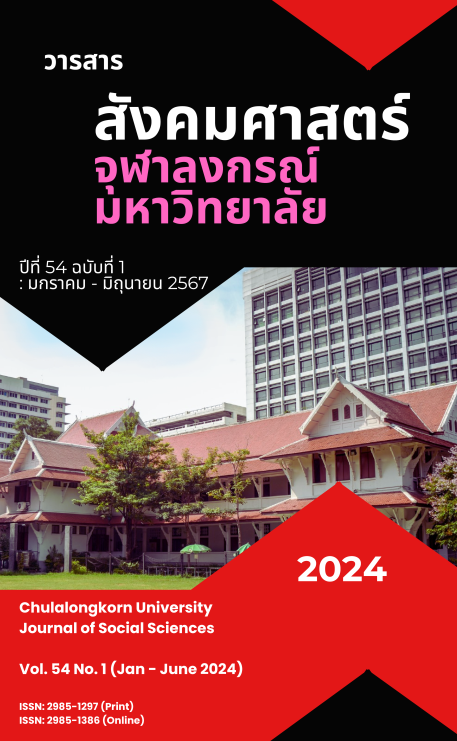The Independence Movement of Catalonia
DOI:
https://doi.org/10.61462/cujss.v54i1.2409Keywords:
Independence, Catalonia, Political space, ConstitutionAbstract
This article examines the Catalonia independence movement by studying the historical background, violence at different stages of the movement, the relationship between the independence movement and the constitution, people's reasons for supporting independence, and the current situation. The special significance of the Catalonia independence movement is because Catalonia is part of Spain, which has many similarities with Thailand. (A new democratic country - about 50 years / a constitutional monarchy system of government / there is an article in the constitution prohibiting separatism)
Currently, the Spanish government uses legislation to ban referendums on independence and imprisons organizers of the referendums on charges of treason because it violates the constitution. The independence movement, therefore, raised questions about the constitution itself. The question asked to the Constitutional Court was, since Article 1 of the constitution states that Spain is a democracy, therefore, how can organizing a referendum on independence based on the right to self-determination (which is part of democratic principles) go against the constitution? Article 2, saying that Spain is a single state and cannot be divided, shows that the constitution is inconsistent, and must be corrected at this point.
The findings of this study of the struggle for independence in Catalonia are that when independence movements have political space, and there is an open internal debate over the question of independence, violent groups pushing for independence gradually dissipate. The violence that remains comes from emotional outbursts during the debate.
Downloads
References
Booth, William. 2017. “Meet the Two Jailed Activists behind Catalonia’s Independence Movement.” Washington Post, October 20, 2017. https://www.washingtonpost.com/world/europe/meet-the-two-jailed-activists-behind-catalonias-independence-movement/2017/10/20/a0a10e4a-b4e0-11e7-9b93-b97043e57a22_story.html.
Erickson, Amanda. 2017. “Analysis | Catalonia’s Independence Vote: What You Need to Know.” Washington Post, October 27, 2017. https://www.washingtonpost.com/news/worldviews/wp/2017/09/30/catalonia-independence-referendum-spain/.
Gurr, Ted Robert. 1993. Minorities at Risk: A Global View of Ethnopolitical Conflicts. Washington, D.C: United States Institute of Peace.
Gurr, Ted Robert. 2000. Peoples Versus States: Minorities at Risk in the New Century. Washington, D.C: United States Institute of Peace.
Harris, Simon. 2014. Catalonia Is Not Spain: A Historical Perspective. 4Cats Books. https://archive.org/details/cataloniaisnotsp0000harr
Hill, Steven. 2017. “To Secede or Not to Secede: Learning from Catalonia.” The Globalist. December 16, 2017. https://www.theglobalist.com/spain-catalonia-secession-eu-europe-independence/.
Lafleche, G. 2018. “Catalonia: The Disgraceful March Continues.” Catalan News Monitor. January 24, 2018. http://catalanmonitor.com/2018/01/24/catalonia-disgrace-marches-on/
Minder, Raphael. 2017. The Struggle for Catalonia: Rebel Politics in Spain. Illustrated edition. London: Hurst.
Mingardi, Alberto. 2017. “The Catalonian Mess.” Econlib. October 3, 2017. https://www.econlib.org/archives/2017/10/the_catalonian_1.html.
Orwell, George. 1938. Homage to Catalonia. Benediction Classics.
Pla, Josep. 2014. The Gray Notebook. Translated by Peter R. Bush. New York Review Books Classics. New York: New York Review Books.
Schaeffer, Robert K. 1998. “Separatism: Democracy and Disintegration.” In Separatism: Rationality and Irony, edited by Metta Spencer. Lanham, Md: Rowman & Littlefield.
Spencer, Metta, ed. 1998. Separatism: Democracy and Disintegration. Lanham, Md: Rowman & Littlefield.
Spencer, Metta. 1998. “When States Divide.” In Separatism: Democracy and Disintegration, edited by Metta Spencer. Lanham, Md: Rowman & Littlefield.
Tobeña, Adolf. 2017. The independent Catalonia would be an extended and catholic Andorra Interview by Cristian Campos. Tercera Cultura. http://www.terceracultura.net/tc/adolf-tobena-the-independent-catalonia-would-be-an-extended-and-catholic-andorra/.
Downloads
Published
How to Cite
Issue
Section
License
Copyright (c) 2024 Faculty of Political Science, Chulalongkorn University

This work is licensed under a Creative Commons Attribution-NonCommercial-NoDerivatives 4.0 International License.
Public Licensing Terms
Copyright and Licensing Policy
The Chulalongkorn University Journal of Social Science publishes all content under the Creative Commons Attribution-NonCommercial-NoDerivatives 4.0 International License (CC BY-NC-ND 4.0).
Copyright
All published articles in the Chulalongkorn University Journal of Social Science are the copyright of the Faculty of Political Science, Chulalongkorn University. Authors transfer all rights to the journal upon acceptance of their manuscript for publication.
CC BY-NC-ND 4.0 License
Under this license:
-
Attribution (BY): Users must give appropriate credit to the authors, the Faculty of Political Science, Chulalongkorn University, and the Chulalongkorn University Journal of Social Science, provide a link to the license, and indicate if changes were made. They may do so in any reasonable manner, but not in any way that suggests the licensor endorses them or their use.
-
NonCommercial (NC): Users may not use the material for commercial purposes. Commercial use requires prior written permission from both the authors and the Faculty of Political Science, Chulalongkorn University.
-
NoDerivatives (ND): If users remix, transform, or build upon the material, they may not distribute the modified material. Adaptations of the work require prior written permission from both the authors and the Faculty of Political Science, Chulalongkorn University.
Open Access Statement
The Chulalongkorn University Journal of Social Science provides immediate open access to its content on the principle that making research freely available to the public supports a greater global exchange of knowledge. Users are allowed to read, download, copy, distribute, print, search, or link to the full texts of the articles without asking prior permission from the publisher or the author, in accordance with the CC BY-NC-ND 4.0 license.
Self-Archiving Policy
Authors may archive the final published version, preprints, or postprints of their articles in institutional repositories or on their personal websites, provided that they acknowledge the original publication in the Chulalongkorn University Journal of Social Science with a complete citation and a link to the journal's website.
Permissions
For any use beyond those covered by the CC BY-NC-ND 4.0 license, please contact:
Editorial Office
Chulalongkorn University Journal of Social Science
Faculty of Political Science, Chulalongkorn University
Email: cusocscij@gmail.com
For more information about the Creative Commons Attribution-NonCommercial-NoDerivatives 4.0 International License, please visit: https://creativecommons.org/licenses/by-nc-nd/4.0/





